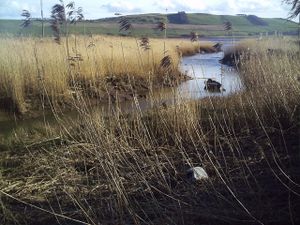Kebbzol
Kebbzol (IPA: /kɛb̪vʒoɭ/) is one of the fifteen states of Gfiewistan. The etymology of the name is unknown, it is possibly originally stemming from a substrate language. Kebbzol borders the state of Hatariew in the north, the river Ersaj in the east, the state of Fojsatan in the south and the state of Wrofatan in the west, except for a very short section that borders the state of Tlulmerd instead.
Geography and economy
Kebbzol has multiple smaller picturesque riverside towns that have always been a popular travel destination for stressed or ill capital residents as well as international tourists. Using the reed found in many places next to Ersaj, the biggest stream of Gfiewistan, locals have historically weaved dozens of different kinds of basket for all possible uses, with traditionally every village and town having its own techniques, ornaments and forms. Today, it remains the most important production sector, with both mass-produced baskets (still using locally grown reed) for the national and international market as well as more durable, handwoven ones sold for tourists and richer countrymen, or made for their own families. Together with tourism, it contributes the most to the local economy, though agriculture (particularly beets and sugar beets), taking place mostly in the more fertile eastern part of the state, still plays a minor role, too. Evergreen needleleaf forests can be found all over the state, but predominantly exist in the west, far away from the Eastern Basin which extends throughout Kebbzol. However, no part is particularly elevated, or even hilly.
Demographics and transport
One of the smaller states, both area- and populationwise (98,673 people), Kebbzol is a state with a negative immigration rate, with sizable emigration into other states. However, in this regard it is still dwarfed by several other states, and the birth rate, the highest in the country, offsets the emigration to an extent.
A ferry on the Ersaj (the only major river touching the state) connects the capital Lakwa (/ɭakʍa/, 27,231 people, etymology unclear) with Hatariew as well as (less regularly) the city of Weishriew, and in addition to that, the eastern national highway passes through the western part of the state and is the main connection to other parts of the country in the northwest and south. All other bigger towns, Detnas (/dɛtnaʂ/, 11,312 people, named after one of the first railway tycoons, K. Detnas), Zwjatalne (/ʒʍʝɐʈaɭnə/, 5,629 people, from ‘zwjatas’ rock and ‘alne’ village) and Hotza (/hotʒa/, 19,168 people, etym.: likely from substrate language) lay on the Hatariew-Weishriew railway. Emigration into other states is sizable, although not outstanding, and to some extent offset by the birth rate, which is the highest in the country.
